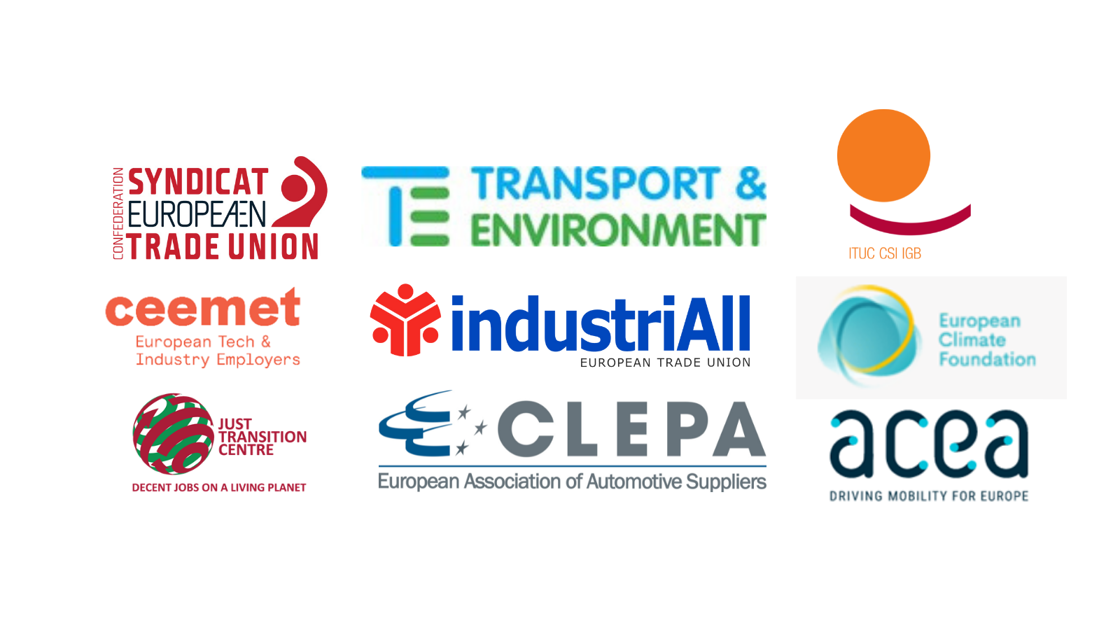Dear Vice-President Timmermans, Dear Frans,
Next week the Commission is set to publish the much-anticipated Fit for 55 package, which will set out the regulatory framework to implement the EU’s Green Deal, Climate Law and increased 2030 targets. As industry, trade unions, employers and environmental organisations, we support the objective of climate neutrality by 2050 and the need for increased ambition in 2030 to reach this. We also agree with your much quoted statement that “there will be a Just Transition or no transition at all”.
Alongside higher climate ambition, we want to see industrial transformation and innovation in Europe, rather than deindustrialisation and social disruption. This demands a policy framework delivering a Just Transition for all the industries covered by the Green Deal and Fit for 55 package. This framework must support the anticipation and management of change, including, but not exclusively, skills and training, and be underpinned by strong social dialogue.
Currently, there is no such framework for the 16 million workers in our mobility eco-system, and notably Europe’s automotive sector which is a powerhouse of industrial employment. The auto sector accounts for more than 6% of European employment overall and 8.5% of European manufacturing jobs. Pre-crisis, the sector produced nearly 10% of GDP in Germany alone, along with 40% of the country’s research and development spend. The sector plays a key role in trade, with Europe responsible for more than 50% of the world’s exports of auto products.
The European Green Deal will accelerate the transformation of the automotive supply chain. Reaching climate neutrality by 2050 requires a rapid strengthening of the policy instruments covering the automotive industry.
This is an industrial revolution of historic proportions. Workers dependent on the automotive industry in Europe currently face fast-moving forces of change. Rapid decarbonisation is intensifying economic change in the sector with restructuring also driven by the aftermath of the COVID 19 crisis, digitalisation and as a result of broader trade and market developments. A series of publications have quantified potential job losses, gains and changes in the automotive sector due to the current transformation. A recent study concluded that the transformation in the passenger car segment alone would require the upskilling and retraining of 2.4 million workers. The European Battery Alliance argues that 800,000 skilled workers are needed for EU e-mobility ambitions. Whilst new jobs will be created in the electromobility ecosystem in battery production and charging infrastructure for example, job losses will be acute in the ICE-supply chain companies and specific regions. Jobs will not be easily interchangeable as they are often located in different places and require different skill sets. The European Commission has already identified the regions depending on the automotive industry as being exposed to multiple challenges while the EU is decarbonising, making the need for regional policy support vital.
An EU Just Transition framework for the automotive workforce is a missing and urgently needed
Despite the importance of the industry and scale of transformation underway, a clear, granular mapping of the employment consequences and trends of a shift towards a climate-neutral automotive industry is still to be done.
This stands in stark contrast to the situation for the 8.8m workers in the energy-intensive industries eco-system and Europe’s carbon-intensive regions which already have a new but growing policy framework in place, with technical support via the Just Transition Platform and funding for regional plans via the Just Transition Mechanism, including a dedicated Just Transition Fund.
These resources cannot be spread thinner as they are already needed for the important challenge in the coal-dependent and carbon-intensive regions and industries, however they can offer a model for a Just Transition for the automotive and broader mobility eco-system.
Such a Just Transition framework must be built on:
- Adequate resources
- Policy support and exchanges of best practices
- Transition planning and social dialogue
Inaction has major risks for Europe. Given the number of jobs at stake and the magnitude of the ongoing transformation, social disruption due to a badly managed transition might severely undermine the ability of the European Green Deal to succeed. We are conscious that the world is watching how the EU implements its climate ambitions, we would like Europe to lead the world in implementing Just Transition as well.
We encourage the Commission to come forward with a Just Transition framework for the automotive and wider mobility eco-system as a matter of urgency. We are ready to contribute actively to the co-design of a Just Transition framework for Europe’s automotive workforce.
Yours sincerely,
CEEMET – European Tech & Industry Employers, CLEPA – European Association of Automotive Suppliers, Transport and Environment,European Climate Foundation
